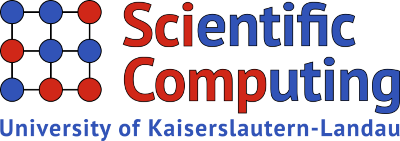Date and Place: Thursdays and hybrid (live in 32-349/online via Zoom). For detailed dates see below!
Content
In the Scientific Computing Seminar we host talks of guests and members of the SciComp team as well as students of mathematics, computer science and engineering. Everybody interested in the topics is welcome.
List of Talks
Event Information:
-
Thu08Feb2024
SC Seminar: Anuja Chakraborty
11:45Hybrid (Room 32-349 and via Zoom)
Anuja Chakraborty, Department of Computer Science, University of Kaiserslautern-Landau (RPTU)
Title: On Compressed Sensing and Dynamic Mode Decomposition
Abstract:
This talk is focused on the discussion regarding the development and application of compressed
sensing strategies for computing the dynamic mode decomposition (DMD) from heavily subsampled
or compressed data. The review was mainly done based on the paper of Brunton’s COMPRESSED
SENSING AND DYNAMIC MODE DECOMPOSITION [1]. The compressed sensing techniques developed
in this work result in DMD eigenvalues that are equivalent to those obtained from full-state data.
This is significant as it enables a consistent representation of system dynamics even with highly
reduced data. Using l1-minimization or greedy algorithms, the study demonstrates the possibility of
reconstructing full-state DMD eigenvectors from the compressed DMD eigenvalues. This
reconstruction allows for the recovery of detailed information about the system’s modes. These
results rely on a number of theoretical advances which is covered in this report. Also, effectiveness of
the proposed compressed sensing architecture is illustrated through two model systems where the
first example is on designing a spatial signal from a sparse vector of Fourier coefficients with a linear
dynamical system driving the coefficients and the second example is on a double gyre flow field,
which is a model for chaotic mixing in the ocean. So, the theoretical insights and practical
demonstrations enhance the understanding and applicability of DMD methodologies in diverse
scenarios.[1] Steven L. Brunton, Joshua L. Proctor, Jonathan H. Tu, J. Nathan Kutz COMPRESSED SENSING AND
DYNAMIC MODE DECOMPOSITION, Journal of Computational Dynamics American Institute of
Mathematical Sciences, Volume 2, Number 2, December 2015How to join online
You can join online via Zoom, using the following link:
https://uni-kl-de.zoom.us/j/63123116305?pwd=Yko3WU9ZblpGR3lGUkVTV1kzMCtUUT09
